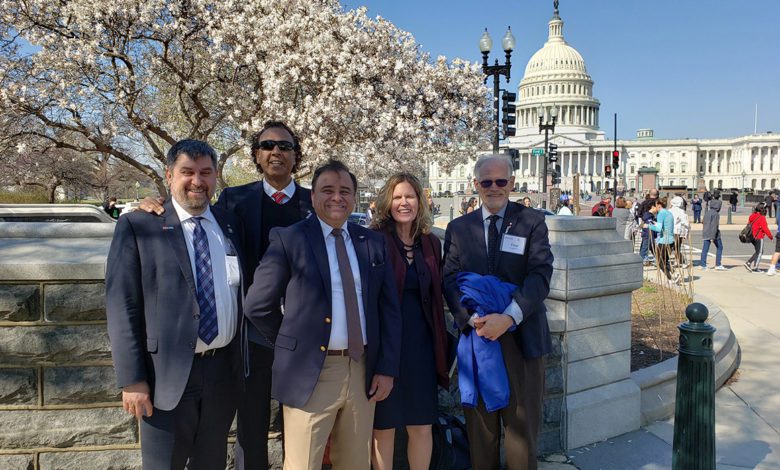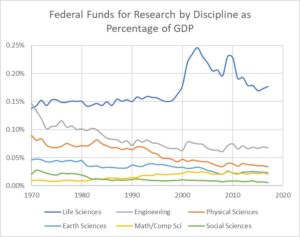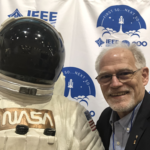
One of IEEE-USA’s primary functions is to influence government policies that benefit U.S. IEEE members. But, many IEEE members don’t understand what IEEE-USA government relations does. So, I’ve devoted this month’s column to sharing some insights into our government relations activities and to invite you to participate.
About IEEE-USA Government Relations
The IEEE-USA Government Relations Council (GRC) reports to the IEEE-USA Board of Directors through the IEEE-USA Vice President of Government Relations. The GRC advances IEEE-USA’s public policy goals and capabilities by providing direction and oversight of IEEE-USA’s government relations programs and committees. Its functions include recommending IEEE-USA’s annual public policy priorities and legislative agenda, and reviewing position statements and whitepapers proposed to the IEEE-USA Board of Directors for adoption. The Board must approve these position statements and whitepapers for them to become official IEEE-USA public policy.
Policies are developed by IEEE-USA’s various public policy committees, often in cooperation with other committees. IEEE-USA always is looking for volunteers to serve on its public policy committees and is open to creating new committees, when appropriate. IEEE-USA’s current policy committees are:
- Artificial Intelligence & Autonomous Systems supports strengthening the nation’s artificial intelligence capabilities by increasing research, developing suitable laws and regulations, addressing workforce needs, and aiding public understanding.
- Communications addresses issues such as digital privacy, spectrum policy, and cybersecurity. This committee interacts with Congress and federal agencies, including the Federal Communications Commission and the Federal Trade Commission.
- Energy provides a comprehensive strategy for improving the nation’s electrical infrastructure, including diverse power generation methods, an intelligent grid, physical and cybersecurity, and a well-qualified workforce.
- Entrepreneurship & Innovation champions legislation and regulation to aid small businesses.
- Intellectual Property recommends policies to balance the patent and copyright interests of businesses and customers, through both legislative proposals and Amicus Curiae briefs to federal courts.
- Research & Development promotes increased federal investment in science and engineering research, revitalized U.S. high-tech manufacturing, STEM education, and related topics.
- STEM Diversity formulates and advocates policies that increase STEM diversity and ethical treatment of STEM professionals and students.
- Transportation and Aerospace addresses the national space program, national aeronautics program, space-based remote sensing, intelligent transportation systems, and safety of autonomous transportation.
The GRC works with IEEE-USA staff, who interact regularly with members of Congress and the Administration to advance IEEE-USA’s public policy objectives. Recent successes include:
- Preserving federal basic research funding
- Establishing IEEE as trusted AI advisor
- Reversing federal S&E conference attendance restrictions
- Making the R&D tax credit permanent
- Reducing tax bill impact on graduate students
 For example, federal support of engineering and physical sciences decreased by a factor of two relative to the Gross Domestic Product before IEEE-USA and other professional societies succeeded in convincing Congress to stop this steady slide. Now, we are working diligently to restore research funding to its 1970 percentage in order to increase the nation’s economic productivity.
For example, federal support of engineering and physical sciences decreased by a factor of two relative to the Gross Domestic Product before IEEE-USA and other professional societies succeeded in convincing Congress to stop this steady slide. Now, we are working diligently to restore research funding to its 1970 percentage in order to increase the nation’s economic productivity.
Our AI program, on the other hand, has focused on developing effective relationships with government decision-makers, responding to requests for policy input, and providing public presentations.
In addition to continuing efforts in support of fundamental research and of artificial intelligence, current GRC priorities include:
- Encouraging STEM diversity and harassment prevention
- Advocating effective digital privacy and cybersecurity
- Improving electrical generation, distribution, and security
- Eliminating H-1B visa abuse while increasing legitimate EB Green Cards
- Reforming patent protection for technologists and small businesses
- Setting the U.S. future course in space
- Strengthening the SBIR/STTR program
Other Government Relations Programs
The annual IEEE-USA Congressional Visits Day — also known as CVD — provides volunteers a structured opportunity to interact with their Senators and Representatives. Last spring, nearly 70 IEEE members (five in photograph above) received training on effectively communicating with Congress, and put that training into practice the following day while visiting their Members of Congress on Capitol Hill.
IEEE-USA also funds year-long fellowships that place well-qualified volunteers in Congressional, State Dept. and USAID offices; and sponsors IEEE Student Members in the WISE summer internship program, where they spend a summer in Washington learning about how technology professionals can participate in the public policy process.
You can read more about IEEE-USA Government Relations here. To volunteer, contact brendan.godfrey@ieee.org and r.t.harrison@ieee.org

Tom Coughlin
IEEE-USA President, 2019






